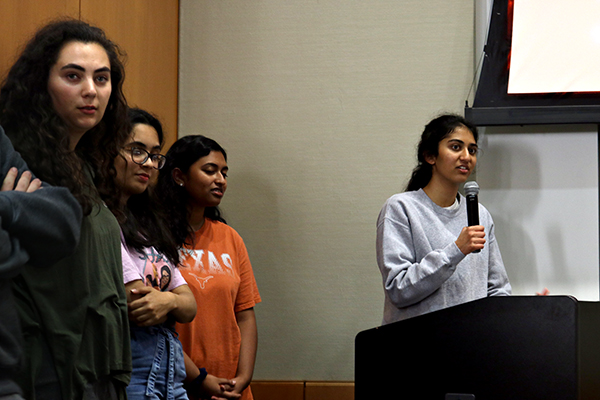Anjitha Nair said she felt forced to drop everything when she got her period.
“I was like, ‘Oh gosh, I need to use the restroom,’ and then I realized my period had come a few days early,” computer science sophomore Nair said. “I typically have a pad, but I wasn’t prepared, so I had to use toilet paper and run to my apartment.”
To address this experience, the Women’s Resource Agency in Student Government proposed providing free menstrual products in bathrooms across campus at its meeting Tuesday. Last year’s SG administration passed legislation asking the University to provide free menstrual products and implemented a pilot program for this in the Texas Union and the William C. Powers, Jr. Student Activity Center buildings.
Nair, an officer in the agency, said she did not consider using bathrooms in the WCP or the Texas Union at the time. Radhika Patel, a co-director of the agency, said she wanted to expand the program to all gender-neutral and women’s bathrooms in academic buildings across campus.
“Often times, (people) are not prepared for it when they get their period in the middle of the day,” said Patel, an economics and math sophomore. “No one should have to leave class and go home and change. Their education should not be hindered by the fact they have to menstruate.”
Alexzandra Roman, a co-director of the agency, said menstrual products are not a luxury and the University should provide them in the same way it provides toilet paper.
“People don’t menstruate for fun,” said Roman, a government sophomore. “The big hurry in making sure (menstrual products) are in all these places is about access to resources. It doesn’t make sense to make a student run across campus because they’re about to bleed through their pants.”
Patel said access to menstrual products matters not only because of public health concerns such as urinary tract infections and toxic shock syndrome, but also because of physical and financial barriers. She said including menstrual products across campus would send a message about destigmatizing periods.
“Having pads and tampons throughout campus sends a message that the University cares about people who menstruate, their health and their ability to take care of themselves,” Patel said.
Roman said implementation of this program would differ from last year because the agency has to contact the administrators of each building.
Sameeha Rizvi, an officer in the agency, said the legislation will make contacting administrators easier. She said the agency wrote the joint resolution so it will have to pass through SG, the Senate of College Councils and the Graduate Student Assembly.
“(The legislation) is a tangible source showing the student body wants this, and it’s up to (the University) to do the right thing,” public health freshman Rizvi said. “We are supporting it and now it’s up to administrators to implement this.”
Nair said the implemented legislation would have solved her problem.
“I wouldn’t have had to go home,” Nair said. “I was going to go get lunch from my friends, but I had to cancel. I was like ‘Nevermind, I need to get a pad.’”





















